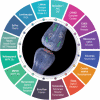Alzheimer's Disease: Novel Targets and Investigational Drugs for Disease Modification
- PMID: 37728864
- PMCID: PMC10582128
- DOI: 10.1007/s40265-023-01938-w
Alzheimer's Disease: Novel Targets and Investigational Drugs for Disease Modification
Abstract
Novel agents addressing non-amyloid, non-tau targets in Alzheimer's Disease (AD) comprise 70% of the AD drug development pipeline of agents currently in clinical trials. Most of the target processes identified in the Common Alzheimer's Disease Research Ontology (CADRO) are represented by novel agents in trials. Inflammation and synaptic plasticity/neuroprotection are the CADRO categories with the largest number of novel candidate therapies. Within these categories, there are few overlapping targets among the test agents. Additional categories being evaluated include apolipoprotein E [Formula: see text] 4 (APOE4) effects, lipids and lipoprotein receptors, neurogenesis, oxidative stress, bioenergetics and metabolism, vascular factors, cell death, growth factors and hormones, circadian rhythm, and epigenetic regulators. We highlight current drugs being tested within these categories and their mechanisms. Trials will be informative regarding which targets can be modulated to produce a slowing of clinical decline. Possible therapeutic combinations of agents may be suggested by trial outcomes. Biomarkers are evolving in concert with new targets and novel agents, and biomarker outcomes offer a means of supporting disease modification by the putative treatment. Identification of novel targets and development of corresponding therapeutics offer an important means of advancing new treatments for AD.
© 2023. The Author(s).
Conflict of interest statement
JC has provided consultation to Acadia, Actinogen, Acumen, AlphaCognition, Aprinoia, AriBio, Artery, Biogen, BioVie, Cassava, Cerecin, Diadem, EIP Pharma, Eisai, GemVax, Genentech, GAP Innovations, Janssen, Jocasta, Karuna, Lilly, Lundbeck, LSP, Merck, NervGen, Novo Nordisk, Oligomerix, Optoceutics, Ono, Otsuka, PRODEO, Prothena, ReMYND, Roche, Sage Therapeutics, Signant Health, Simcere, Suven, SynapseBio, TrueBinding, Vaxxinity, and Wren pharmaceutical, assessment, and investment companies. AL and JK have no disclosures.
Figures
References
Publication types
MeSH terms
Substances
Grants and funding
LinkOut - more resources
Full Text Sources
Other Literature Sources
Medical



